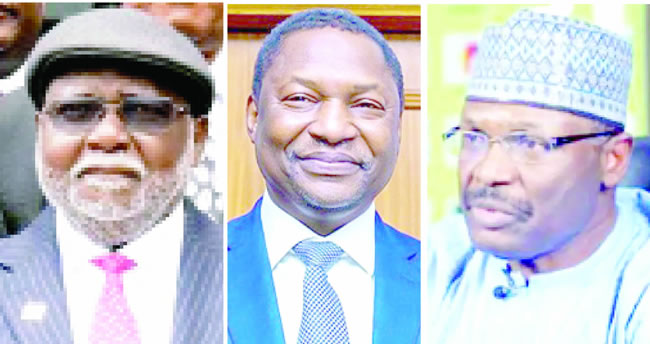

LANRE ADEWOLE and YEJIDE GBENGA-OGUNDARE seek answers to the posers thrown at the governorship poll by court findings.
In about 72 hours, electorate will be returning to the polling units nationwide to elect new governors and state lawmakers but the confusion over the process of transmitting the results, real-time, remains, The Jury can disclose.

The presidential and legislative election of a fortnight ran into turbulence over the failure of the Independent National Electoral Commission (INEC) to upload results immediately as earlier promised and stated in the Guidelines issued by the Commission, acting on the powers allotted it, by the Electoral Act (2022).
The Guidelines made it mandatory for the election results from the polling units to be transmitted immediately, from the voting points, to the server of the commission where they can be perused real-time by the stakeholders. But more than 48 hours after the completion of the elections and the declaration of the results at the polling units, INEC did not transmit the results, resulting in varied accusations that have now discredited the poll worldwide.
INEC had given a myriad of excuses, with the leadership, blaming middle-level officers on the field, for the failure to adhere to its own Guidelines.

Candidates in the elections have also commenced the process of challenging the legality of the conduct of the election as well as the outcomes, with the issue of transmitting the results real-time as required by the Guidelines of INEC, forming a major plank of the arguments of those calling for the outright cancellation of the disputed poll.

As INEC struggles to extricate itself from the legal bind, jurisprudential arguments are coming from different perspectives, on why the electoral commission may or may not have messed up the fortnight poll and why there could even be a repeat of the handling of the presidential election, in next poll.
Though INEC has kept signaling that it plans to do a real-time uploading of the results from this weekend’s election, senior lawyers, sympathetic to the ruling party which was declared the winner of the presidential election and majority winner of National Assembly seats, have continued to exonerate the Commission from any wrongdoings over the inability to obey its Guidelines.
The ruling party has also made the argument that INEC isn’t under any obligations to transmit election results real-time, because the Electoral Act, didn’t specifically compel it, though this argument has been dismissed by the opposition, who insist that INEC isn’t allowed to breach any rule, whether an act of the parliament or the Guidelines it sets for itself.
INEC must comply.
Courts have also waded into the controversy and interestingly, two Federal High Court, in Lagos and Abuja have given conflicting rulings on same request by the Labour Party, which has been calling for election integrity.
In Lagos, the Federal Court ordered INEC to use electronic transmission to upload the results of the forthcoming poll.
Its Abuja counterpart, ruled that the commission isn’t under any compulsion and could choose any methods, so desire, to collate the results of the election, just like it did, a fortnight back.
Justice Peter Lifu’s judgement in Lagos, has however been officially communicated to INEC in Abuja and its subsidiary in Lagos, by the Labour Party and 41 others, who went to court, seeking an order of mandamus to compel INEC to comply with the Electoral Act and its Guidelines for the conduct of the governorship elections.
Justice Peter Lifu held that the court had the jurisdiction to entertain the suit because it was commenced in accordance with the provisions of the law, while clarifying that the subject matter of the suit was not a pre-election issue because the reliefs sought by the applicants deal with preparation for elections and not the conduct of the elections.
According to Justice Lifu, the applicants were trying to compel INEC to comply with the Constitution, its regulations, and guidelines following its failure to do so during the presidential and National Assembly elections of February 25.
The court therefore, granted the applicants “an order of mandamus directing and compelling the defendant and all its agents and their privies or any persons acting under their directions to comply with and enforce the provision of Clause 37 of the Regulations and Guidelines for the Conduct of Elections, 2022 for the conduct of the governorship and House of Assembly elections in Lagos State on 11 March 2023”.
The judge’s ruling, mandates that the Presiding Officer of all polling units in Lagos State must paste the Publication of Result Poster EC60(E) at the polling units conspicuously after completing the EC8A result sheet.
The ruling is a significant win for advocates of election integrity and those seeking for more technological inputs into the processes of the elections for better outputs, as it now ties INEC to accountability and compliance with the regulations and guidelines for the conduct of the remaining elections.
Experts also see the ruling as a significant development in Nigeria’s political ecosystem, as the use of electronic transmission of results is largely seen as a critical tool in promoting transparency, accountability and credibility in the electoral process.
His Lordship disagrees.
The Federal High Court in Abuja disagreed, saying only INEC is empowered by law to determine the mode of collating and transmitting election results.
Justice Emeka Nwite, held that only INEC has the prerogative to direct how Polling Unit Presiding Officer should transfer election results, including the total number of accredited voters and results of the ballot, adding that collating and transferring election results manually in the 2023 general elections cannot be said to be contrary to the relevant provisions of the Electoral Act, 2022.
Nwite was ruling in a suit marked: FHC/ABJ/CS/1454/2022, brought by the Labour Party (LP), with INEC as the sole defendant. The plaintiff had prayed the court to declare that INEC has no power to opt for manual method other than the electronic method provided for by the relevant provisions the Electoral Act, 2022. It urged the court to issue an order directing/compelling INEC to comply with the Electoral Act, 2022 on electronic transmission of result in the forthcoming general election.
The judgement was delivered on January 23, 2023, before the presidential election, while the ruling compelling INEC, was after the presidential and National Assembly poll. INEC has spoken more in favour of obeying the latest ruling.
Justice Nwite held that, “From the argument of the learned plaintiff’s counsel, I am of the humble opinion that the bone of contention or the sections that seek for interpretation are actually sections 50(2) 60(5) and 62(2) of the Electoral Act, 2922. Section 47(2) as cited by the learned counsel to the plaintiff only deals with accreditation of voters using a Smart Card Reader, but not collation or transmission of result as postulated by the learned counsel.”
He further stated that Section 60(5) of the Electoral Act, 2022 provides for the transfer of election result, including the total number of the accredited voters from the polling unit, adding that Section 62(2) of the same Act provides for compilation, maintenance and continuous update of the register of election result as distinct database for all polling units’ results as collated in all elections conducted by the commission.
Dismissing Labour Party’s concern, the trial judge said “The said Section 62(2) has mandated that such register of election results shall be kept in an electronic format by the commission at its national headquarters. Now a close reading of Section 50(2) of the Act has provided for voting and transmission of result to be done in accordance with the procedure to be determined by the commission. This is to say that the commission is at liberty to prescribe or choose the manner in which election results shall be transmitted.
“In same ambit, Section 60(5) empowered the Polling Unit Presiding Officer to transfer the election results, including the total number of accredited voters and results of the ballot in a manner to be prescribed by the commission. This is also to say the commission is again at liberty to prescribe to the Polling Units’ Presiding Officer the manner in which to collate and transfer the election results as well as the accredited number of voters in an election under the Act.
“In view of the foregoing, can the act of the defendant (INEC) in collating and transferring election results manually in the forthcoming 2023 general elections be said to be contrary to the relevant provisions of the Electoral Act, 2022?. The answer can only be in the negative as there is no where in the above cited sections where the commission or any of its Agents is mandated to only use an electronic means in collating or transferring of election result. If any, the commission is only mandated to collate and transfer election results and number of accredited voters in a way or manner deemed fit by it.
“In view of the above, I am finding that, by the provisions of Sections 50(2) and 60(5) of the Electoral Act, 2022 the correct interpretation of the said statutes is that the defendant (INEC) is at liberty to prescribe the manner in which election results could be transmitted and I so hold.”
Lawyers’ views.
Senior Advocate of Nigeria, Chief Yomi Alliyu is in agreement with Justice Nwite.
He said, “Electoral Act is superior to guidelines. The foundation of any election is the polling booth. As long as BVAS is used at the polling booth, the election is in tandem with the law. In any case the Federal High Court has ruled that the INEC has unfettered discretion on the modus operandi of any election; that is whether it will be manual or electronic or both. Until set aside, that is the current position of the law, moreso when it was a political party that sought for it. I agree with the judge.
“Irev is just a last server for Form EC8A already in the hands of party agents. It is to serve as check on what the BVAS captured hence different from BVAS that actually captured the biometrics of a voter. If there is conflict between BVAS and the content of Form EC8A, the former prevails. Thus if 100 was captured by BVAS and IREV on the server that took the picture of the form shows 200 the election will be cancelled. If it is 67 on BVAS or even 99 the election stands since it means that some were accredited but for some reasons refused to vote!”
A former chairman of Nigerian Bar Association, Ikeja branch, Dave Ajetomobi, says Act triumphs Guidelines.
“Electoral Act is the law made by the national assembly and assented to by the president. The Act empowers the INEC to make rules or guidelines to facilitate its operations, such power is regarded as delegated legislation, (and) a delegated legislation cannot override the Act which confers the power. In certain election cases before the current Act, the courts ruled the guidelines of INEC on the former device before BVAS cannot override the Act, the former machine was provided for under INEC guidelines not the Act” he submitted.
YOU SHOULD NOT MISS THESE HEADLINES FROM NIGERIAN TRIBUNE
Governorship poll: Lagos, Oyo, Nasarawa, Rivers, Delta, Kaduna, five others are key battle states
2023 elections: Tinubu’s victory not God’s plan for Nigeria, Peter Obi replies Aisha Buhari, others
I never intended to toy with any lady’s emotions —Yemi Cregx
2023 presidential poll: We’ll hit streets if courts don’t work – LP
Super Eagles legend Vincent Enyeama ranked greatest African goalkeeper









